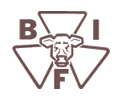'It's Not About Cow Farts'
Is feed efficiency related to methane production by cattle?
by Troy Smith, field editor, Angus Journal®
LINCOLN, Neb. (June 20, 2014) — Interest in improving feed efficiency in cattle is motivated primarily by the desire to reduce production costs and thus increase profitability. However, U.S. Meat Animal Research Center scientist Harvey Freetly says increasing feed efficiency of cattle by reducing their feed intake also reduces their production of methane — one of the so-called greenhouse gases. A project leader in nutrition and environmental management research, Freetly talked about the link between feed efficiency and methane production during the 2014 Beef Improvement Federation (BIF) symposium June 18-21 in Lincoln, Neb.

If feed efficiency is increased by decreasing feed intake, there would be a decrease in methane production, explained Harvey Freetly, USMARC. However, if feed efficiency is increased by improved digestion, methane production would actually increase with increased feed efficiency.
Freetly said he felt compelled to correct a widely held misconception regarding methane production in cattle. He criticized the mainstream media for repeatedly getting it wrong in articles that associate methane emissions with cattle flatulence. For Freetly, it has become a pet peeve.
“It’s not about cow farts,” stated Freetly, explaining that more than 80% of the methane production occurs in the rumen and is expelled as burps. “Only 13% of methane is produced in the lower intestinal tract, and some of that comes back up. Only 2% to 3% of the methane an animal produces is expelled through the anus.”
People who blame large-scale cattle-feeding operations for major contributions to methane production also get it wrong. Freetly explained that animals consuming high-concentrate feedlot diets actually produce less methane than breeding herds and growing cattle whose diets consist of mostly or exclusively forage.
Freetly explained that methane production increases with feed intake. Therefore, animals that consume less feed produce less methane. So, increasing the feed efficiency of cattle holds promise for reducing methane production.
“The methane footprint can be reduced by decreasing days between birth and harvest, and by decreasing the total feed requirement,” Freetly affirmed.
He said the methane footprint of the cow herd is reduced when each cow weans a calf every year, weaning weights are increased and cow feed requirements are low.
The 2014 BIF Annual Meeting & Research Symposium was hosted by the University of Nebraska–Lincoln, the U.S. Meat Animal Research Center and the Nebraska Cattlemen June 18-21 in Lincoln, Neb. The Angus Journal and LiveAuctions.tv provide comprehensive online coverage of the event at www.BIFconference.com. Visit the Newsroom for summaries, proceedings, PowerPoints and audio of the sessions; the Awards page for announcements of award winners; and the Photos page for galleries of photos from the meeting and the tours.
Editor’s Note: This summary was written under contract or by staff of the Angus Journal.Through an agreement with the Beef Improvement Federation, we are encouraging reprinting of the articles to those who will adhere to the reprint guidelines available on this site. Please review those guidelines or contact Shauna Rose Hermel, editor, at 816-383-5270. PowerPoints are posted with permission of the presenter and may not be reproduced in whole or in part without the express permission of the presenter.
API's coverage of the event is made possible through collaboration with BIF and sponsorship of LiveAuctions.tv. For questions about this site, or to notify us of broken links, click here.
Headquartered in Saint Joseph, Mo., API publishes the Angus Journal, the Angus Beef Bulletin, the Angus Beef Bulletin EXTRA, and the Angus Journal Daily, as well as providing online coverage of events and topics pertinent to cattlemen through the Angus Journal Virtual Library.



